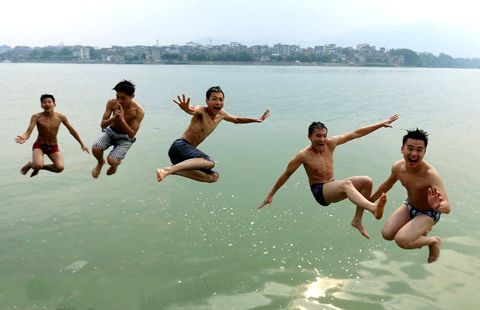Antarctic glaciers melting twice as fast as previously estimated
Updated: 2014-07-08 13:36
(Xinhua)
|
||||||||
SYDNEY -- Shifting winds are dragging warm water currents around the Antarctic coastline forcing ice to melt and sea levels to rise twice as faster than previously thought, according to new Australian research revealed on Tuesday.
Scientists from the University of New South Wales (UNSW) found the warm water can be 4 degrees warmer than the cold water it displaces and has serious consequences for rising global sea levels which will reshaping coastlines.
"What you usually have is cold water sitting next to the ice shelves at about minus 2 degrees Celsius and then warm water further out," Paul Spence from the Climate Change Research Center at UNSW told the Australian Broadcasting Commission (ABC).
"We found by using projected wind forces to the end of this century that warm waters tend to flood onshore, right next to the grounding lines of the glacial ice sheets.
"It could lead to a massive increase in the rate of ice sheet melt, with direct consequences for global sea level rise."
Researchers said that the melting of some ice sheets in Antarctica is probably now irreversible.
A team of scientists from UNSW and the Australian National University (ANU) have for the first time modeled how sub-surface ocean temperatures down to 700 meters are rapidly changing around Antarctica because of shifting wind patterns, thought to be partly due to global warming.
"It certainly was for me a very frightening result," Spence said.
"I didn't fully appreciate how sensitive this part of the ocean was to change and how ripe a situation it was for providing dramatic impacts on the ice sheets."
He said the research shows sub-surface warming at twice the rate previously thought.
"They weren't considering the types of temperature warming that we're seeing in our model simulations around the Antarctic coastline," Spence said.
But scientists cannot predict when these warm waters will trigger cascading glacial loss.
"It's not unlike an avalanche of snow, where you don't quite know when it's going to happen but when it happens, it can happen quickly," Spence said.
The Australian Antarctic Division's Tas van Ommen said the effects of a rapidly transforming Antarctica are now likely to be felt this century.
"We need to bear in mind that even modest sea level rises half- a-meter to a meter is a very big change and if we are going to see estimates now of several tenths of a meter more than that by the end of this century, that's going to rapidly reshape our response to sea level rise," he said.
"What's concerning is that with a heavily populated planet it's going to reshape our coastlines in ways that matter in this century."
- Scientists: Antarctic Ocean has strongest winds in 1,000 years
- Pilot meets challenge of Antarctic rescue
- Chinese icebreaker concludes China's 30th Antarctic expedition
- China's Xuelong to return from 30th Antarctic expedition
- China's Antarctic explorers show biological sample
- Spirit of adventure in Antarctic

 'God father' of HK art honored for Smithsonian exhibit
'God father' of HK art honored for Smithsonian exhibit
 Grateful blessings
Grateful blessings
 Visitors tour Chinese warships
Visitors tour Chinese warships
 Chinese-American police officers rise in NYPD
Chinese-American police officers rise in NYPD
 The world in photos: June 30 - July 6
The world in photos: June 30 - July 6
 Chinese navy to join 2014 RIMPAC naval drill
Chinese navy to join 2014 RIMPAC naval drill
 Gettysburg reenactment marks 151st anniversary
Gettysburg reenactment marks 151st anniversary
 Washington splashed with fireworks
Washington splashed with fireworks
Most Viewed
Editor's Picks

|

|

|

|

|

|
Today's Top News
Chinese envoy: 'Time is ripe' for BRICS' bank
US south benefitting from China investment
Talks may help US soy exports
Product placement deal transforms into dispute
China approves Lenovo, IBM $2.3b server deal
Meet the new breed of migrant workers
NetJets awaits green light to start China operations
Unleashing the power of innovation
US Weekly

|

|






